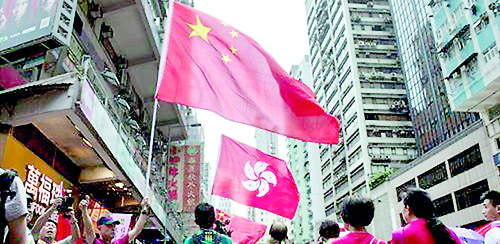Sunday Times 2
China warns foreign powers not to use Hong Kong as a ‘bridgehead’
View(s):BEIJING (Reuters) – China has warned against any foreign interference ahead of a crucial ruling on the city’s political future on Sunday, saying Beijing will not tolerate the use of Hong Kong “as a bridgehead to subvert and infiltrate the mainland”.
China’s largely rubber-stamp parliament is set to meet on Sunday, when it is expected to limit 2017 elections for Hong Kong’s leader to a handful of pro-Beijing candidates, a move likely to escalate plans by pro-democracy activists to blockade the city’s Central business district.

People hold Chinese national flags and a Hong Kong regional flag as they take part in a march against the Occupy Central movement in Hong Kong (AFP)
According to state media, an unidentified spokesman from the Chinese foreign ministry’s Department of Hong Kong, Macau and Taiwan Affairs said China would promptly “make solemn representations” to any “external force” that interfered in Hong Kong’s internal affairs.
Hong Kong is a special administrative region (SAR) of China, administered by what is known as the Basic Law.
In an interview with state news agency Xinhua on Friday, the unidentified spokesman said “some people” ignored the long-term interests of Hong Kong and the provisions of the Basic Law “to collude with external forces in an attempt to interfere [with] the SAR government administration”.
The spokesman did not identify any outside countries. In 2013, U.S. envoy to Hong Kong Clifford Hart said Washington would continue to back “genuine universal suffrage” there. Such a strongly worded statement from the ministry signals increasing anxiety among Chinese leaders about the outcome of Sunday’s decision, which will be watched closely by diplomats and international human rights groups.
The expected decision to limit the number of candidates for the 2017 elections could trigger a showdown with pro-democracy demonstrators who are planning an “Occupy Central” campaign.
Hong Kong returned to Chinese rule in 1997 and there have been fierce debates in the past year over how its next leader is chosen in 2017 – by universal suffrage, as the democrats would like, or from a list of pro-Beijing candidates.
It returned under a principle of “one country, two systems” allowing it broad autonomy and far more freedom of speech, assembly and religion than exists on the mainland.
However, China has made it plain that Beijing’s sovereignty cannot be questioned. Beijing has ratcheted up its control despite promises to grant the city a high degree of autonomy and eventual universal suffrage, alarming many in Hong Kong and international observers.
| China tells journalists to learn ‘Marxist news values’
BEIJING (Reuters) – China ordered its journalists on Saturday to learn “Marxist news values” and uphold the principles of news as prescribed by the ruling Communist Party, the latest step in President Xi Jinping’s crackdown on the media. The guidelines by the All China Journalists’ Association, published by state news agency Xinhua, are aimed at both traditional and online media and are another sign of Xi’s politically conservative agenda. The association said journalists “must learn to master Marxist news values”. “Let us hold high the banner of socialist core values,” the report said, using the party’s term for orthodox beliefs. Xi has espoused old school Maoism as he seeks to court powerful conservative elements in the party. Like many officials before him, Xi is steeped in the party’s long-held belief that loosening control too quickly or even at all could lead to chaos and the break up of the country. In July, the State Administration of Press, Publication, Radio, Film and Television said China would toughen curbs on journalists disclosing state and commercial secrets. Chinese state media has traditionally been the main vehicle for party propaganda. Reforms over the past decade that have allowed greater media commercialization and limited increases in editorial independence, combined with the rise of social media, have weakened government control slightly. |

